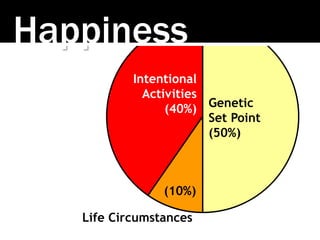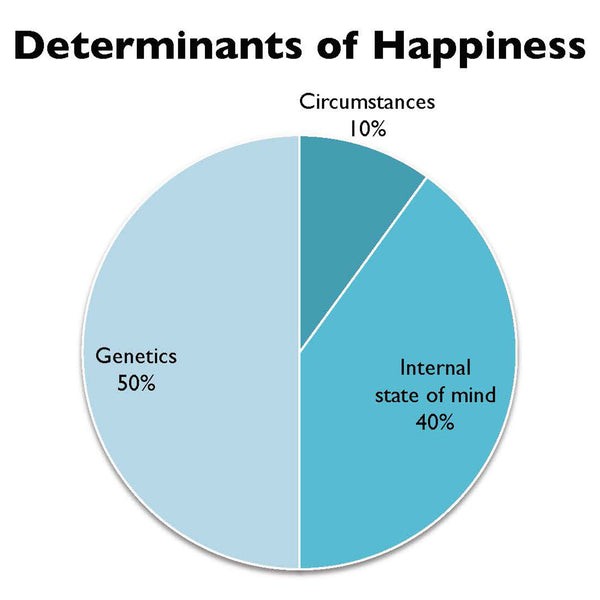Intentional Happiness: How 40% Of Your Joy Comes From Self-Care
Did you know that 40% of your happiness comes from self-care? It’s true! Taking care of yourself is not only important for your physical and mental wellbeing but also plays a significant role in your overall happiness. In this article, we will explore the concept of intentional happiness and delve into why self-care is such an essential element in creating a joyful and fulfilling life. So, grab a cup of tea, find a comfy spot, and get ready to discover how you can prioritize self-care and boost your happiness levels.

The Importance of Self-Care for Happiness
Understanding the Connection Between Self-Care and Happiness
Happiness is a fundamental aspect of a fulfilling life, and self-care plays a crucial role in nurturing and maintaining our overall sense of well-being. When we prioritize self-care, we actively invest in our physical, mental, and emotional health, which in turn contributes to our happiness. By taking intentional steps to care for ourselves, we can experience a significant improvement in our overall quality of life.
Defining Intentional Happiness
Intentional happiness refers to the deliberate pursuit and cultivation of joy in our lives. It acknowledges that happiness is not solely dependent on external circumstances, but also on our internal mindset and the choices we make. By actively engaging in self-care practices, we can create an intentional framework for cultivating happiness in our lives, regardless of external factors.
Exploring the 40% Rule
Research suggests that approximately 40% of our happiness is within our control and can be influenced by intentional actions such as self-care. This finding highlights the significant impact self-care can have on our overall well-being and happiness. By dedicating time and effort to engage in self-care practices, we can harness this 40% and truly take charge of our own happiness.
Recognizing the Potential Impact of Self-Care on Overall Joy
Self-care has the potential to positively impact various aspects of our lives, contributing to our overall joy and fulfillment. By incorporating self-care into our daily routines, we can enhance our sense of self-worth and self-compassion, reduce stress, improve physical health and energy levels, and enhance emotional well-being and relationships. By recognizing the potential impact of self-care, we can prioritize it as an essential aspect of our lives.
What is Self-Care?
Defining Self-Care
Self-care refers to the intentional actions we take to nurture and prioritize our own physical, mental, and emotional well-being. It involves recognizing our individual needs and taking steps to fulfill them. Self-care is a proactive approach to self-nurturing, ensuring that we have the resources and energy to meet the demands of our daily lives.
Different Forms of Self-Care
Self-care can take various forms, as it is highly individualized and dependent on personal preferences and needs. Physical self-care involves activities such as exercise, hygiene, and proper nutrition. Mental and emotional self-care includes practices like mindfulness, therapy, and engaging in activities that bring joy or relaxation. Spiritual self-care encompasses practices that deepen our connection to something greater than ourselves, such as meditation or spending time in nature. Social self-care involves nurturing and maintaining healthy relationships and setting boundaries to protect our emotional well-being.
The Role of Self-Care in Mental and Emotional Well-being
Self-care is essential for maintaining optimal mental and emotional well-being. By engaging in self-care practices, we can reduce stress, alleviate symptoms of anxiety and depression, and improve our overall emotional resilience. Taking time for ourselves allows us to recharge and rejuvenate, enabling us to cope better with life’s challenges and maintain a positive mindset.
The Benefits of Self-Care for Happiness
Enhanced Sense of Self-Worth and Self-compassion
When we prioritize self-care, we send a clear message to ourselves that we are deserving of love, care, and attention. This cultivates an enhanced sense of self-worth and self-compassion, allowing us to approach life with confidence and treat ourselves with kindness and understanding. Building a strong foundation of self-worth and self-compassion is vital for overall happiness and well-being.
Reduced Stress and Increased Resilience
Engaging in self-care activities helps to reduce stress and enhance our ability to handle life’s challenges. By taking regular breaks, practicing relaxation techniques, and engaging in activities that bring us joy, we can lower our stress levels and increase our resilience. The ability to cope effectively with stress is crucial for maintaining happiness and overall emotional well-being.
Improved Physical Health and Energy Levels
Physical self-care, such as regular exercise, adequate sleep, and a balanced diet, is essential for our overall well-being. When we take care of our physical health, we experience increased energy levels, improved mood, and reduced risk of physical ailments. The connection between physical and mental well-being is significant, and by prioritizing our physical health, we are actively contributing to our overall happiness.
Enhanced Emotional Well-being and Relationships
Self-care plays a crucial role in promoting emotional well-being and nurturing healthy relationships. When we prioritize self-care, we are better able to manage our emotions, communicate effectively, and maintain healthy boundaries. By taking care of ourselves, we can show up as our best selves in our relationships, fostering deeper connections and overall happiness.
Practical Self-Care Strategies for Intentional Happiness
Creating a Personalized Self-Care Toolkit
Creating a personalized self-care toolkit involves identifying activities and practices that nourish and recharge you. Consider activities that bring you joy, relaxation, or a sense of accomplishment. This toolkit can include practices such as journaling, practicing gratitude, engaging in hobbies, or spending time in nature. By creating a toolkit tailored to your needs and preferences, you can have a readily available resource to turn to when you need to prioritize self-care.
The Importance of Self-Care Assessment and Planning
Taking the time to assess your self-care needs and planning accordingly is crucial for maintaining intentional happiness. Reflect on the areas of your life that require more attention and identify specific self-care activities that address those needs. Set aside dedicated time in your schedule to engage in those activities and commit to making them a priority. By assessing and planning your self-care, you are actively investing in your overall well-being and happiness.
Incorporating Self-Care Into Daily Routines
Integrating self-care into your daily routines ensures that it becomes a consistent and non-negotiable part of your life. Start by identifying small pockets of time throughout your day where you can engage in self-care activities. This could be as simple as waking up a few minutes earlier to practice mindfulness or incorporating small breaks throughout your workday for relaxation exercises. By incorporating self-care into your daily life, you are making a powerful commitment to your overall happiness and well-being.

Self-Care Practices for Different Areas of Life
Self-Care for Physical Well-being
Engaging in physical self-care is essential for promoting overall well-being and happiness. This could include activities such as regular exercise, maintaining a nutritious diet, getting enough sleep, and practicing relaxation techniques. Prioritizing physical well-being allows us to feel energized, vibrant, and capable of taking on life’s challenges.
Self-Care for Mental and Emotional Well-being
To ensure optimal mental and emotional well-being, it is crucial to engage in self-care practices that nurture and support our inner selves. This could involve activities such as practicing mindfulness or meditation, attending therapy or counseling, engaging in creative pursuits, or spending quality time alone. By taking care of our mental and emotional health, we can cultivate a resilient and positive mindset, contributing to our overall happiness.
Self-Care for Spiritual and Existential Well-being
Nurturing our spiritual and existential well-being is an important aspect of self-care. This could involve practices such as meditation, prayer, spending time in nature, or engaging in activities that align with our personal beliefs or values. By connecting with something greater than ourselves, we can find a sense of purpose, fulfillment, and inner peace.
Self-Care for Social and Relationship Well-being
Social and relationship self-care involves nurturing and maintaining healthy connections and setting boundaries to protect our emotional well-being. This may include spending quality time with loved ones, fostering new relationships, or reassessing and redefining toxic or draining relationships. By surrounding ourselves with positive and supportive individuals, we can cultivate a strong support system and experience greater happiness in our social and relationship dynamics.
Overcoming Barriers to Self-Care and Happiness
Identifying and Addressing Guilt and Self-Sabotage
Guilt and self-sabotage are common barriers to prioritizing self-care. It is important to recognize and challenge these negative thought patterns, allowing ourselves to let go of guilt and prioritize our well-being. Remind yourself that self-care is not selfish but necessary for your overall happiness and ability to show up fully in other areas of your life.
Overcoming Time and Resource Constraints
Many individuals cite time and resource constraints as obstacles to practicing self-care. However, self-care does not need to be time-consuming or expensive. Start by identifying small pockets of time throughout your day where you can engage in self-care activities, even if it’s just for a few minutes. Look for low-cost or free options for self-care, such as reading a book from your local library or taking a walk in nature. By becoming creative and resourceful, you can overcome these barriers and prioritize self-care.
Navigating Societal Expectations and Norms
Societal expectations and norms can often discourage individuals from prioritizing self-care. However, it is vital to remember that your well-being should always be a top priority. Challenge societal expectations that perpetuate the idea that self-care is selfish or indulgent. Set clear boundaries and communicate your needs to others, ensuring that you create space for self-care in your life without guilt or hesitation.
Seeking Support and Accountability
Seeking support and accountability from trusted friends, family, or professionals can help overcome barriers to self-care and happiness. Share your goals and intentions with others, and ask for their support and encouragement. Consider enlisting the help of a therapist or coach who can provide guidance and accountability along your self-care journey. By surrounding yourself with a supportive network, you can overcome barriers and continue prioritizing self-care.

Tips for Cultivating a Self-Care Mindset
Prioritizing Self-Care and Setting Boundaries
To cultivate a self-care mindset, it is crucial to prioritize your own well-being and set clear boundaries. Recognize that you are deserving of care and commit to making self-care a non-negotiable aspect of your life. Set boundaries with others to protect your time and energy, ensuring that you have the space to engage in self-care activities without guilt or interruption.
Practicing Self-Compassion and Acceptance
Self-compassion and acceptance are essential components of a self-care mindset. Treat yourself with kindness, understanding, and forgiveness, recognizing that self-care is an ongoing journey. Embrace the imperfections and setbacks along the way, and remember that self-care is about progress, not perfection.
Fostering a Growth Mindset
Cultivating a growth mindset can support a self-care mindset, as it involves embracing challenges and seeking opportunities for personal growth. View self-care as an ever-evolving process, open to experimenting with new activities and adapting your self-care practices as needed. Embrace the mindset that you can learn and grow through self-care, leading to greater happiness and self-discovery.
Embracing Mindfulness and Presence
Mindfulness and present moment awareness can help cultivate a self-care mindset by grounding us in the present and fostering a greater connection with ourselves. Engage in mindfulness practices such as meditation or mindful breathing to quiet the mind and tune into your needs. By being fully present, you can better understand what your self-care needs are and act upon them intentionally.
Self-Care vs. Self-Indulgence: Finding the Balance
Understanding the Difference Between Healthy Self-Care and Escapist Behavior
It is important to recognize the distinction between healthy self-care and escapist behaviors. Healthy self-care focuses on nurturing our well-being and promoting overall happiness. It involves engaging in activities that enhance our physical, mental, and emotional health. Escapist behavior, on the other hand, involves numbing or avoiding uncomfortable emotions or situations through unhealthy habits or activities. By understanding this difference, we can ensure that our self-care practices are truly beneficial rather than detrimental.
Setting Healthy Limits and Recognizing Warning Signs
To maintain a balance between self-care and self-indulgence, it is crucial to set healthy limits for ourselves. Pay attention to warning signs that indicate when self-care practices may be veering into self-indulgence territory. This could include neglecting responsibilities, excessive indulgence in pleasure-seeking activities, or using self-care as a means of avoiding necessary challenges. By setting healthy limits and recognizing warning signs, we can maintain a balanced approach to self-care.

The Role of Self-Care in Building Resilience
Utilizing Self-Care to Cope with Life Challenges and Stressors
Self-care is a powerful tool for building resilience and coping with life’s challenges and stressors. By engaging in self-care practices, we can replenish our energy, reduce stress, and develop effective coping strategies. Regular self-care enhances our ability to bounce back from adversity, allowing us to navigate life’s ups and downs with greater ease and resilience.
Developing Adaptive Coping Strategies Through Self-Care
Engaging in self-care provides an opportunity to develop adaptive coping strategies that can be applied to various aspects of life. By actively investing in our well-being, we learn to navigate challenges with greater resilience and flexibility. Self-care allows us to develop a toolbox of coping strategies that can be utilized when faced with adversity, supporting our overall emotional well-being and happiness.
Conclusion
Embracing the power of self-care is essential for cultivating intentional happiness in our lives. By recognizing the connection between self-care and happiness, defining our self-care needs, and implementing practical strategies, we can prioritize our well-being and experience a greater sense of joy and fulfillment. Taking the first steps towards a healthier and happier life begins with acknowledging the importance of self-care and making it a priority. So, dedicate time and resources to nurture your body, mind, and spirit, and experience the transformative impact of intentional happiness through self-care.


















